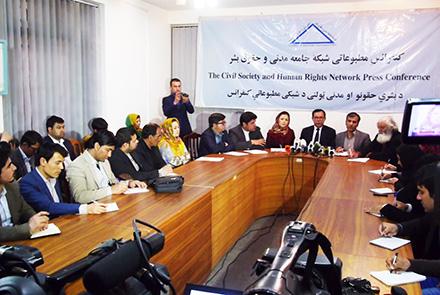Mohammad Naeem Nazari, the head of the Afghan Civil Society Human Rights Network, on Thursday raised doubts over government’s election programs, claiming the National Unity Government (NUG) does not have the will to hold elections this year.
He said government’s claim that it will hold elections this solar year was deceptive.
He also accused government of playing games regarding policies on election reforms.
The network declared the ongoing delay of parliamentary and district council elections a violation of democratic values.
“We demand the implementation of systematic reforms, but this does not mean the reform and election process should be postponed or delayed,” said Nazari.
Joining Nazari, meanwhile, the former chief of the Independent Election Commission (IEC) Fazel Ahmad Manavi said to hold elections this solar year, government needs to accelerate efforts for reforms.
“Until now we had expectations that there would be the necessary reforms in place and major progress would have taken place in the commission, unfortunately it has not happened so far,” said Manavi.
Along with other challenges regarding elections, government’s plan to implement a single-seat electoral constituency has also attracted criticism from civil society activists and election experts.
Civil society activist Ahmad Zaki meanwhile implied that many people would be deterred from voting if it was a single-seat constituency system.
“This is not practical in Afghanistan,” said Zaki.
“If the elections are not held on time, then going to the ballot boxes and democracy would not have any meaning,” said another civil society activist Zahra.
Government Defiant Over Election Reforms Agenda
Amid speculation over government’s lack of commitment for election reforms, the office of CEO Abdullah Abdullah on Thursday reaffirmed the NUG’s commitment to conduct the poll as scheduled.
According to the CEO’s office, the NUG was prepared financially and technically to conduct the elections this solar year.
“We are completely prepared financially and in terms of security; the process will be implemented this year,” said the CEO’s deputy spokesman Jawed Faisal.
Civil society activists cast doubt over the NUG’s election reform agenda after government announced it had entered into negotiations with its international partners to implement an e-voting system which is aimed at ensuring the credibility and legitimacy of elections which had been badly eroded during the 2014 presidential elections.
In addition to this, the United Nations Assistance Mission (UNAMA) in Afghanistan has said that it is encouraged by current efforts underway to hold elections.
“The UN Assistance Mission in Afghanistan (UNAMA) is encouraged by the strong partnership between the government of Afghanistan, Afghan electoral institutions, and the international community towards the holding of credible, transparent parliamentary and district council elections,” UNAMA said in a statement on Thursday.
Speaking after a meeting on elections chaired by President Ashraf Ghani and attended by Abdullah, senior government officials and the international community representatives, Pernille Dahler Kardel, UNAMA’s acting head, said: “We all recognize the need to do elections differently so that trust can be rebuilt in the electoral process. Tonight we reaffirmed our common vision of elections as a crucial step forward in the consolidation of democracy in Afghanistan, and the future stability of the country.”
“At the meeting, partners expressed willingness to consider new technologies as a way to strengthen the credibility of future elections and enhance public trust in the process. They highlighted the importance of a thorough and inclusive process to assess the potential risks, benefits and costs as the country decides which approach to take to reach that goal,” the statement read.
“All participants expressed their strong support for the electoral institutions of Afghanistan, and underlined the principles of independence and integrity in the work of the Independent Electoral Commission and the Electoral Complaints Commission,” the statement concluded.


